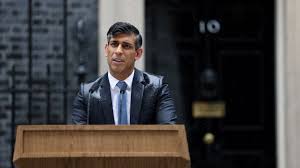UK politicians set off on a 6-week election campaign framed as choice between continuity and change

London: Britain’s political party leaders were crisscrossing the country on Thursday, the first day of a six-week election campaign in which voters will decide whether to end the governing Conservatives’ 14 years in power and hand the opposition Labour Party the reins of government.
Prime Minister Rishi Sunak, battling to overcome the widespread sense that his party is on the ropes, gambled on an earlier-than-expected July 4 election, arguing the Conservatives can give the country security in turbulent times. Labour says it will bring much-needed change after years of political and economic turmoil under the Tories.
“We will stop the chaos,” said Labour leader Keir Starmer, the current favorite to be Britain’s next prime minister. He said that if the Conservatives “get another five years, they will feel entitled to carry on exactly as they are. Nothing will change.”
“You now have the power, the chance to end the chaos, to turn the page and rebuild Britain,” he told voters at a campaign stop in southeast England.
Sunak took many of his own lawmakers by surprise when he called the election Wednesday, in an ill-starred televised announcement outside 10 Downing St. that saw him drenched with rain and drowned out by protesters blasting a Labour campaign song.
Most had expected a fall election after Sunak said repeatedly that the vote would be in the second half of the year. July 4 fits that bill, barely.
Sunak, who plans to visiting England, Scotland, Wales and Northern Ireland in the next 48 hours, said Thursday that the election call showed “I’m prepared to take bold action.”
“Uncertain times demand bold action in order to deliver security,” he told the BBC. “That’s what I will bring.”
Elections in the U.K. have to be held no more than five years apart, but the prime minister can choose the timing within that period. Sunak, 44, had until December to name the date.
Sunak fired the starting pistol on the day official figures showed U.K. inflation falling to 2.3%, allowing Sunak to say he had met a key pledge of getting rising prices under control. Inflation peaked at more than 11% in late 2022.
Sunak’s center-right party has been in power since 2010, and last won an election in December 2019. Since then it has struggled to overcome a series of crises including an economic slump, ethics scandals and a revolving door of leaders in the past two years.
Sunak took office in October 2022 following the disastrous tenure of Liz Truss, who lasted only 49 days after her economic policies rocked financial markets. Truss had been chosen by party members after Boris Johnson was ousted over a series of ethics scandals.
The election will be held against the backdrop of a cost-of-living crisis and deep divisions over how to deal with migrants and asylum seekers making risky English Channel crossings from Europe.
Opponents said Sunak’s choice of a summer election amounted to an admission that his flagship plan on migration — a contentious deal to send people who arrive in small boats on a one-way trip to Rwanda — is likely to fail. Sunak said last month that the deportation flights would begin in July.
On Thursday he told radio station LBC that “If I’m elected, we will get the flights off,” specifying that he meant ”after the election.”
Voters across the United Kingdom will choose all 650 members of the House of Commons for a term of up to five years. The party that commands a majority in the Commons, either alone or in coalition, will form the next government and its leader will be prime minister.
Starmer, a former chief prosecutor for England and Wales, has dragged his party towards the political center ground since 2020, when he replaced Jeremy Corbyn, a staunch socialist who led Labour to two election defeats.
Opinion polls taken before the election date was announced gave Labour a double-digit lead. An Ipsos poll taken last week put the opposition party on 41% compared to 20% for the Conservatives. The pollster interviewed 1,008 British adults between May 8 and 14, and the margin of error is plus or minus three percentage points.
Many unknowns stand between either main party and a majority of seats in Parliament, including the different political landscape in Scotland, where the pro-independence Scottish National Party has dominated for years. The SNP is undergoing its own woes, and Labour hopes for a resurgence.
The centrist Liberal Democrats also sometimes challenge Labour but mostly pose a threat to the Conservatives in south and southwest England.
The hard-right Reform U.K. party — formerly the Brexit Party of Nigel Farage — could pose a threat to the Conservatives in parts of England’s former industrial heartland that the Conservatives won, often for the first time, in 2019.
Farage, who has never been elected to Parliament despite multiple attempts, said Thursday that he would not run in the election, but would “do my bit to help,” likely in his role as TV talk show host and hard-line firebrand.





